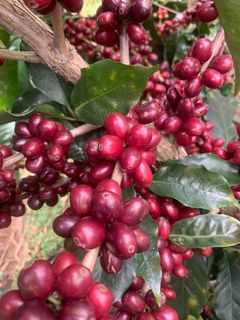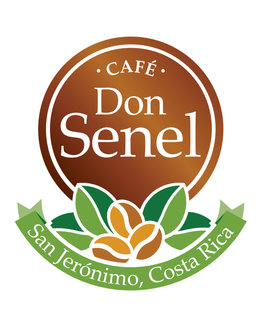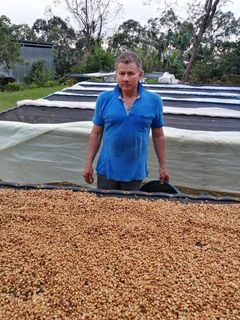May 2021
Feature #31
It's always exciting to explore new origins, so it was a pleasant surprise when Meebz Coffee Roasters presented us with the option of this coffee from Costa Rica. Add to that, being introduced to Yellow Rooster Coffee Imports, who have recently arrived on the New Zealand Coffee scene and from our first converstion, its clear we will be seeing some amazing coffees and producers stories coming via them in the future.
May 2021 is our second collaboration with Meebz Coffee Roasters, which left us reminissing about our first collabortaion.
Our May collaboration featured insights into:
THE PRODUCER:
A background in farming of a different kind and having spent time working in construction in America, Senel Campos
brings a different approach to coffee farming.
Where many other producers methods are steeped in tradition, Senel is fresh the into the world of coffee
(approx 12 years) having turned his attention from cows and construction to coffee.
He brings a humble attitude and a thirst for knowledge. Through this open-mindedness and willingness to take advice he puts into practice the wisdom of everybody from Agronomists to neighbours and exporters.
Unsatisfied with the returns of the commodity market provided by a third part mill, in 2014 Senel took action and
ventured in to the specialty coffee market. Starting out with approx 135kg of carefully cultivated coffee, Senel strategically stepped away from the rule book of commodity coffee, approaching the processing with the very
same innovation and open-mindedness that would see him stand out from the crowd.
Senel retrofitted a washing machine motor to his de-pulper to assist in the processing of the experimental coffee.
Persistence and calculated risk paid off, with a resulting cup score a gratifying 88.75. Continued hard work and meticulous processes employed at La Toboba have paid off with the Campos family now recognised as producing some of the best Honey andNatural coffees in the region.
THE COFFEE:
Developed in Brazil in 1949, Catuai is a cross between Mondo Novo and Caturra, resulting in a shrub of small
stature, lending itself to intensive planting and efficient harvesting. Released into Costa Rica in 1975 it is regarded
as an economically important variety and its cultivation has spread throughout the country.
The Campos family have discovered through experimentation a uniqueness to Catuai with its ability to provide an
exceptionally floral and aromatic coffee when yeast is used in the processing. The resulting flavours diverge away from typical Catuai profiles, curiously enough they have not been able to replicate this experiment with any other varieties grown at the farm, indicating it to be a reaction exclusive to red Catuai.
The preparation undertaken at La Toboba begins with careful selection and hand picking of the coffee cherries,
which are then de pulped to remove the skin.
The parchment is then placed into fermentation tanks where they are receive an application of indigenous yeast to ensure reduction of mucilage. After being subjected to a 24 hour fermentation the coffee is vigorously washed, before being returned to the fermentation tanks for a further 24 hours, this time without yeast. Following the second fermentation, the coffee is washed a third and final time before being laid to dry on raised beds to ensure even drying.
COSTA RICA:
Coffee has been an integral part of life for Costa Rica for some 200 years, so much so that the local government distributed coffee seeds on the eve of of their independence from Spain in 1821 and a little over 20 years later became their first export (and only export for the next 47 years).
While somewhat of a pioneer or forerunner in the coffee scene, Costa Rica is today one of the leaders in traceability thanks to its micro mills and micro lots, hailing from many varied micro climates such as that of Brunca, alongside Costa Ricas tallest mountain, Cerro Chirripo.
Brunca, home to La Totoba is one of Costa Ricas 8 growing regions and contributes 20% of their national coffee production, the majority coming from large fair trade cooperatives, with some high quality specialty grade coffees such as Senel’s being produced at the higher altitudes in the region.
Small lots are a default in Costa Rica with 90 percent of the 50,000 producers tending to small farms of less than 5 hectares.
The greater population of coffee producers send their coffee cherries to local mills (either owned by a cooperative or privately) for processing, typically these mills have produced very clean profile washed coffees.
Despite having a history steeped in coffee production and export, the cost of coffee production in Costa Rica remains incredibly high due to high costs of basic necessities, expensive fuel prices and minimum wage rates.
TASTING NOTES:
Country: Costa Rica
Region: San Jeronimo, Bruca
Farm: La Toboba
Growers: Senel Campos Valverde
Altitude: 1500 – 1900 MASL
Varietal/Species: Red Catuai
Process: Triple Washed with yeast,
dried on raised beds
Tasting notes:
Cranberry and Plum Juice
Citrus Lime
Crisp Acidity
RECIPE:
Pour Over:
Ratio: 1:15
Time: Less than 2 minute brew time
Espresso:
Ratio: 1:1.9
Time: 28-32 seconds
Photos thanks to Yellow Rooster Coffee Imports
|
© Copyright Derelict Coffee Roasters |




